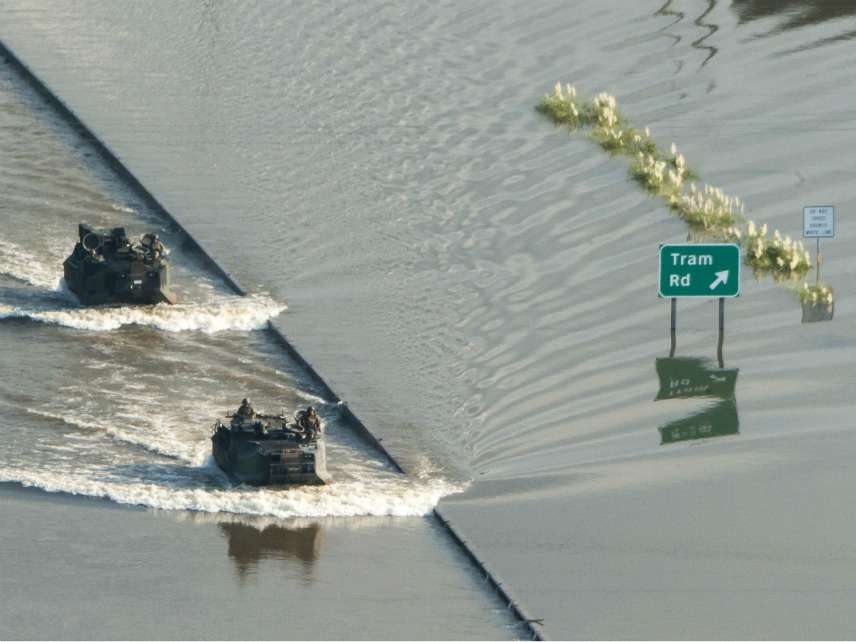No, Flooding in Houston Was Not Caused By a Lack of Zoning Laws
The "development kills" crowd has failed to take into account the very creation of Houston and its long and colorful history of being underwater.

What caused the devastating floods in Houston?
A simpleton might answer that it was the massive hurricane that dumped 50-plus inches of water on the city is the span of a few days. Which is why the mainstream media do not hire simpletons. According to them it was the city's almost criminal lack of zoning.
"The real villains in Harvey flood: urban sprawl and the politicians who allowed it," reads a Guardian headline. "Houston is Drowning—In Its Freedom From Regulation" says Newsweek. Outlets like the Washington Post have pointed the finger at Houston's "wild west growth", spurred by a lack of comprehensive urban planning, as a reason for the severity of the recent floods.
The claim being made is the absence of zoning—making Houston unique among major American cities—has allowed developers to pave over with impermeable concrete otherwise absorptive prairie and wetlands, thus preventing them from soaking up storm water exacerbating flooding.
The idea's surface plausibility falls apart in the specifics.
According to one estimate, Houston's paving over of wetlands cost it the ability to absorb four billion gallons of water. Hurricane Harvey dumped 19 trillion gallons of water on the city.
The "development kills" crowd has also failed to take into account the very creation of Houston and its long and colorful history of being underwater. "Downtown Houston has suffered a major flood on average about once a decade as far back as records extend in the 1830s," said Phil Magnus, an economic historian and Houston native in a recent blog post.
In 1935, when Houston was sprawl-free, the Buffalo Bayou—the main waterway through the downtown—rose some 54 feet during a flood. The bayourose 40 feet during the worst of Harvey.
Houston's landscape, not its land use policies, are responsible for this persistent flooding, Magnus says. The city is incredibly flat, with only small streams and bayous to drain away storm water. That topography is spectacularly ill-equipped to drain the sudden deluges of hurricane rain.
The flat, rural prairie around Interstate 10 in far west Houston, which saw some of the worst flooding, has very little development, Magnus says.
And even if one were to accept that sprawling development makes flooding considerably worse, there is no reason to assume zoning would improve it, says Ray Lehmann of the R Street Institute.
"The way that zoning has been used in most places is to deter density," Lehmann tells Reason. While Houston is the only major city to not have zoning regulation "most of the country looks like Houston, and, much like Houston, has sprawl."
When compared to other major U.S. cities, Houston actually has more permeable land, not less.
Only 39 percent of the city's land is taken up by impervious surface coverings according to U.S. Forest Service data. That's compares to 41 percent in New Orleans, 54 percent in Los Angeles, and 61 percent in New York City—all cities with traditional zoning regulations.
Houston's lack of zoning—far from causing damage to the city—may also help it rebuild faster than other cities seriously damaged by storms.
"I think it will actually be a more dynamic rebuilding which you wouldn't see in places that have a more traditional zoning code," Vanessa Brown Calder, an urban policy analyst with the Cato Institute, tells Reason. "There is just a lot more ability to move and make changes given what they've learned from the damage associated with the storm."
Contrast that with New Orleans after Hurricane Katrina, she says, where rigid zoning codes prevented damaged developments in flooded parts of the city to be rebuilt elsewhere.
While the media spin their groundless narratives of the destructive power of zoning, the people of Houston will be rebuilding, safe in the knowledge they won't be told how to do it by some zoning—or editorial—board.
Rent Free is a weekly newsletter from Christian Britschgi on urbanism and the fight for less regulation, more housing, more property rights, and more freedom in America's cities.


Show Comments (42)